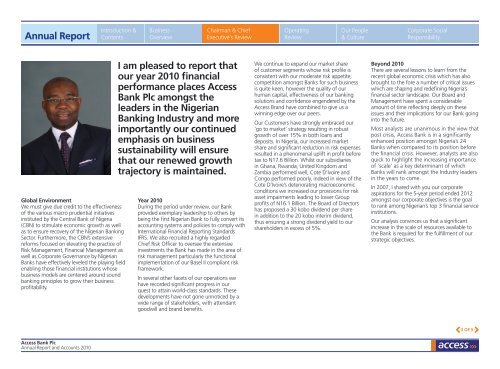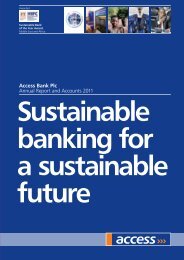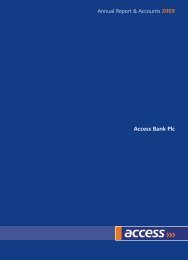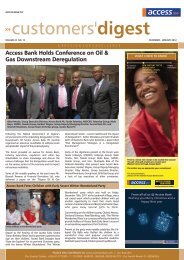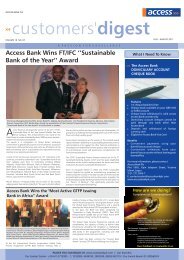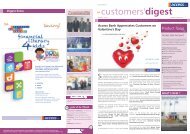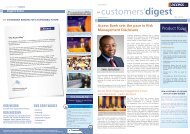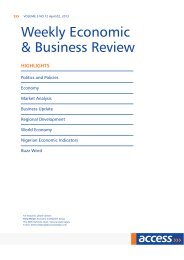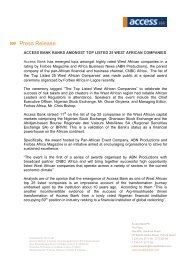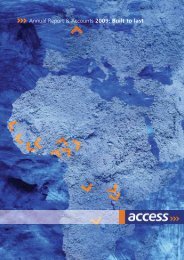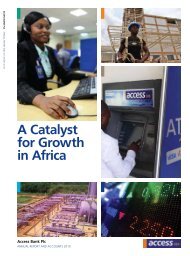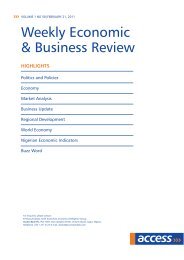2010 Access Bank Annual Report and Accounts
2010 Access Bank Annual Report and Accounts
2010 Access Bank Annual Report and Accounts
Create successful ePaper yourself
Turn your PDF publications into a flip-book with our unique Google optimized e-Paper software.
<strong>Annual</strong> <strong>Report</strong><br />
Introduction & Business Chairman & Chief Operating Our People Corporate Social<br />
Contents Overview Executive’s Review Review & Culture Responsibility<br />
Global Environment<br />
We must give due credit to the effectiveness<br />
of the various macro prudential initiatives<br />
instituted by the Central <strong>Bank</strong> of Nigeria<br />
(CBN) to stimulate economic growth as well<br />
as to ensure recovery of the Nigerian <strong>Bank</strong>ing<br />
Sector. Furthermore, the CBN’s extensive<br />
reforms focused on elevating the practice of<br />
Risk Management, Financial Management as<br />
well as Corporate Governance by Nigerian<br />
<strong>Bank</strong>s have effectively leveled the playing field<br />
enabling those financial institutions whose<br />
business models are centered around sound<br />
banking principles to grow their business<br />
profitability.<br />
I am pleased to report that<br />
our year <strong>2010</strong> financial<br />
performance places <strong>Access</strong><br />
<strong>Bank</strong> Plc amongst the<br />
leaders in the Nigerian<br />
<strong>Bank</strong>ing Industry <strong>and</strong> more<br />
importantly our continued<br />
emphasis on business<br />
sustainability will ensure<br />
that our renewed growth<br />
trajectory is maintained.<br />
Year <strong>2010</strong><br />
During the period under review, our <strong>Bank</strong><br />
provided exemplary leadership to others by<br />
being the first Nigerian <strong>Bank</strong> to fully convert its<br />
accounting systems <strong>and</strong> policies to comply with<br />
International Financial <strong>Report</strong>ing St<strong>and</strong>ards<br />
IFRS. We also recruited a highly regarded<br />
Chief Risk Officer to oversee the extensive<br />
investments the <strong>Bank</strong> has made in the area of<br />
risk management particularly the functional<br />
implementation of our Basel II compliant risk<br />
framework.<br />
In several other facets of our operations we<br />
have recorded significant progress in our<br />
quest to attain world-class st<strong>and</strong>ards. These<br />
developments have not gone unnoticed by a<br />
wide range of stakeholders, with attendant<br />
goodwill <strong>and</strong> br<strong>and</strong> benefits.<br />
We continue to exp<strong>and</strong> our market share<br />
of customer segments whose risk profile is<br />
consistent with our moderate risk appetite;<br />
competition amongst <strong>Bank</strong>s for such business<br />
is quite keen, however the quality of our<br />
human capital, effectiveness of our banking<br />
solutions <strong>and</strong> confidence engendered by the<br />
<strong>Access</strong> Br<strong>and</strong> have combined to give us a<br />
winning edge over our peers.<br />
Our Customers have strongly embraced our<br />
‘go to market’ strategy resulting in robust<br />
growth of over 15% in both loans <strong>and</strong><br />
deposits. In Nigeria, our increased market<br />
share <strong>and</strong> significant reduction in risk expenses<br />
resulted in a phenomenal uplift in profit before<br />
tax to N17.6 Billion. Whilst our subsidiaries<br />
in Ghana, Rw<strong>and</strong>a, United Kingdom <strong>and</strong><br />
Zambia performed well, Cote D’Ivoire <strong>and</strong><br />
Congo performed poorly, indeed in view of the<br />
Cote D’Ivoire’s deteriorating macroeconomic<br />
conditions we increased our provisions for risk<br />
asset impairments leading to lower Group<br />
profits of N16.1 Billion. The Board of Directors<br />
has proposed a 30 kobo dividend per share<br />
in addition to the 20 kobo interim dividend,<br />
thus ensuring a strong dividend yield to our<br />
shareholders in excess of 5%.<br />
Beyond <strong>2010</strong><br />
There are several lessons to learn from the<br />
recent global economic crisis which has also<br />
brought to the fore a number of critical issues<br />
which are shaping <strong>and</strong> redefining Nigeria’s<br />
financial sector l<strong>and</strong>scape. Our Board <strong>and</strong><br />
Management have spent a considerable<br />
amount of time reflecting deeply on these<br />
issues <strong>and</strong> their implications for our <strong>Bank</strong> going<br />
into the future.<br />
Most analysts are unanimous in the view that<br />
post crisis, <strong>Access</strong> <strong>Bank</strong> is in a significantly<br />
enhanced position amongst Nigeria’s 24<br />
<strong>Bank</strong>s when compared to its position before<br />
the financial crisis. However, analysts are also<br />
quick to highlight the increasing importance<br />
of ‘scale’ as a key determinant of which<br />
<strong>Bank</strong>s will rank amongst the Industry leaders<br />
in the years to come.<br />
In 2007, I shared with you our corporate<br />
aspirations for the 5-year period ended 2012<br />
amongst our corporate objectives is the goal<br />
to rank among Nigerian’s top 3 financial service<br />
institutions.<br />
Our analysis convinces us that a significant<br />
increase in the scale of resources available to<br />
the <strong>Bank</strong> is required for the fulfillment of our<br />
strategic objectives.<br />
3 OF 5<br />
<strong>Access</strong> <strong>Bank</strong> Plc<br />
<strong>Annual</strong> <strong>Report</strong> <strong>and</strong> <strong>Accounts</strong> <strong>2010</strong>


